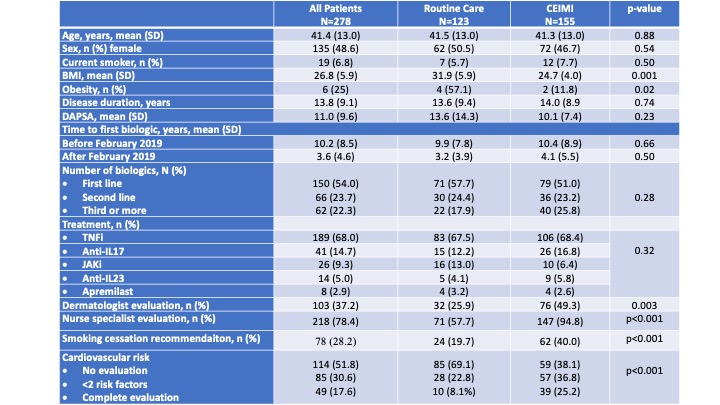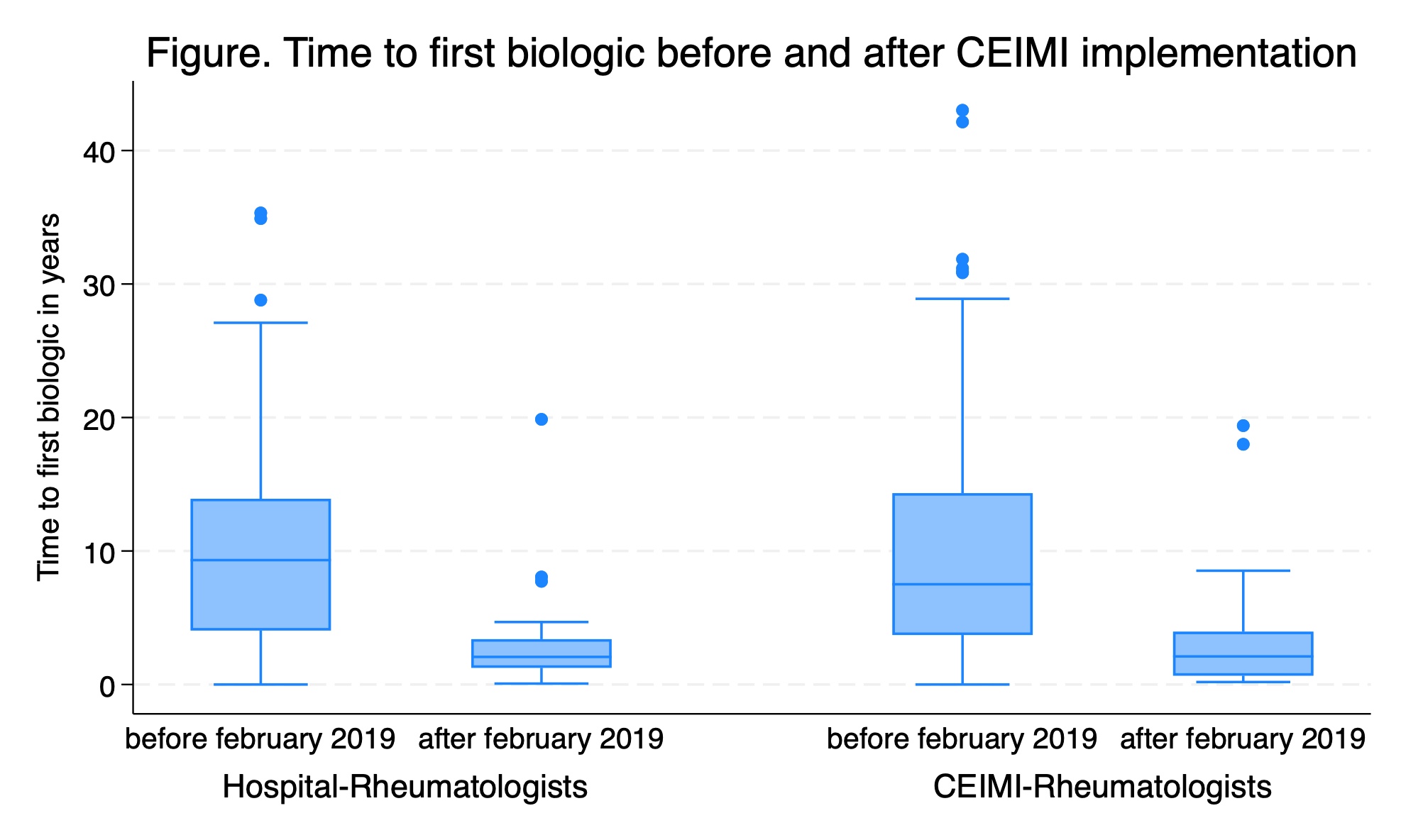Session Information
Session Type: Poster Session A
Session Time: 10:30AM-12:30PM
Background/Purpose: Psoriatic arthritis (PsA) has a heterogenous clinical phenotype with manifestations in a number of different organs and systems. These include not only enthesitis, synovitis and psoriasis but also uveitis, inflammatory bowel disease and metabolic syndrome between others. These varied manifestations recall the importance of a multi-disciplinary approach to overcome multiple challenges faced in providing high-quality care to patients with PsA from the pre-diagnosis phase of disease to the follow-up period. We aim to evaluate the impact of a multidisciplinary center to treat patients with immune mediated inflammatory diseases (IMID) in the management of patients with PsA.
Methods: A specialized center to treat patients with IMID (CEIMI) with a holistic approach to patients was initiated in February 2019 at our University Medical Center. The multi-specialty team include 3 rheumatologists, 3 gastroenterologists, 2 dermatologists, 2 ophthalmologists, clinical nurse specialists and in site pharmacy and immunization clinics. This combined clinic model allows comprehensive evaluation and management of patients through improved communications between disciplines and foster educational activities for both patients and physicians. Patients with PsA on biologic or targeted synthetic DMARDs (b/tsDMARD) evaluated at routine care versus CEIMI-multidisciplinary care were identified. Clinical, demographic, and treatment variables were collected retrospectively by electronic medical record review. Evaluation of traditional cardiovascular risk factors were also collected. A descriptive analysis is presented.
Results: A total of 278 patients with PsA on b/tsDMARD were included in this analysis, 123 (44%) with active follow-up at our routine care clinic and 155 (56%) at CEIMI-multidisciplinary care. Average age was 41.4, disease duration 13.8 years, 48.6% were female, with no significant differences between groups. Patients in the routine care group have higher BMI and higher proportion of obesity (Table). Time to first biologic decrease significantly in both groups after CEIMI implementation, from 9.9 to 3.2 at routine care (p< 0.001) and from 10.4 to 4.1 at CEIMI (p< 0.001) (Figure). Number of biologics and prescription patterns were similar between groups. A higher percentage of patients have an evaluation by a dermatologist (49.3 vs 25.9, p=0.003), and by the nurse specialist (94.4 vs 57.7, p< 0.001) at CEIMI-multidisciplinary care, with a better evaluation for cardiovascular risk and smoking cessation recommendations (Table).
Conclusion: Our multidisciplinary approach seems effective in improving management of psoriatic disease reducing the time to first biologic initiation in both CEIMI and routine care rheumatology clinic. We identified a better assessment of cardiovascular risk and control for risk factors as smoking cessation and obesity in patients with active follow-up at CEIMI-multidisciplinary care.
To cite this abstract in AMA style:
Sánchez-Lucas M, Bourgeois C, Molina-Collada J, Gonzalez-Hernandez T, Nieto Gonzalez J, Lopez-Esteban A, Baniandres O, Chamorro de Vega E, Castrejon I. Impact of a Multidisciplinary Rheumatology-Dermatology-Gastroenterology Center in the Management of Patients with Psoriatic Arthritis: Analysis of the First 5-years of Implementation [abstract]. Arthritis Rheumatol. 2024; 76 (suppl 9). https://acrabstracts.org/abstract/impact-of-a-multidisciplinary-rheumatology-dermatology-gastroenterology-center-in-the-management-of-patients-with-psoriatic-arthritis-analysis-of-the-first-5-years-of-implementation/. Accessed .« Back to ACR Convergence 2024
ACR Meeting Abstracts - https://acrabstracts.org/abstract/impact-of-a-multidisciplinary-rheumatology-dermatology-gastroenterology-center-in-the-management-of-patients-with-psoriatic-arthritis-analysis-of-the-first-5-years-of-implementation/


